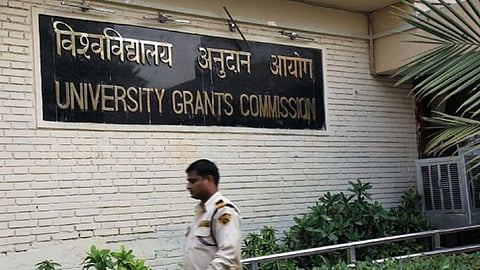
New Delhi - The University Grants Commission has been making significant decisions lately, granting autonomy to universities and determining admission criteria for research scholars.
One might assume that these important decisions stem from a bench that thoroughly understands the matter. However, a cursory search on their official website reveals that the commission is not operating at its full potential.
The UGC Act of 1956, as amended in 1985, outlines the composition of the Commission:
The Commission shall consist of a Chairman, a Vice-Chairman, and ten other members, all appointed by the Central Government.
The Chairman must be chosen from individuals who are not officers of the Central Government or any State Government.
Regarding the other members mentioned in clause (iii) of subsection (1):
Two members shall be chosen from among officers of the Central Government to represent that Government.
Not less than four members shall be chosen from among persons who are, at the time of their selection, teachers at Universities.
The remaining members shall be chosen from among individuals who:
Have knowledge of or experience in agriculture, commerce, forestry, or industry.
Are members of the engineering, legal, medical, or any other learned profession; or
Serve as Vice-Chancellors of Universities or, if not teachers at Universities, are recognized as educationists of repute or have obtained high academic distinctions, according to the opinion of the Central Government.
It is stipulated that at least one-half of the number chosen under this clause shall not be officers of the Central Government or any State Government.
Currently, the UGC is experiencing a vacancy rate of two-thirds of its member positions. Presently, the UGC comprises a chairman, a vice-chairman, and two officials from the central government, lacking representation from teachers or experts.
The four current members of the commission are as follows:
- Professor Mamidala Jagadesh Kumar, Chairman of the UGC
- Professor Deepak Kumar Srivastava, Vice-Chairman of the UGC
- K. Sanjay Murthy, Secretary of the Department of Higher Education within the Ministry of Education
- Sanjay Prasad, Additional Secretary in the Department of Expenditure within the Ministry of Finance.
The Mooknayak reached out to Colonel Vipin Kaushal, who serves as the joint secretary at UGC, as well as the office of Secretary Mrs. Rekha Kumra. Both acknowledged the vacancies of the post and responded by stating that the filling of posts is dependent on the education ministry.
Colonel Vipin Kaushal further mentioned that the filling of posts is currently in progress, but no specific timeline can be provided for the same.
When asked about how key decisions are being made by the body without any teachers’ representation, Colonel Kaushal declined to answer the question over the phone, expressing a reluctance to provide a response.
The Mooknayak further reached out to Dr. Nandita Narain, who serves as the president of the Democratic Teachers’ Front and is a professor at Delhi University.
Discussing the state of the UGC, the professor remarked, “The UGC is being utilized as a propaganda tool by the party in power. We have never witnessed such blatant exploitation of the commission for political purposes.”
She expressed disappointment over the commission's failure to fully reconstitute all its members, emphasizing that such action is crucial for instilling confidence in the decision-making process of the body.
In a critique aimed at the government and the commission, she stated, “The UGC has transformed into a mere post office that merely delivers notices from various ministries and blindly implements them, such as the selfie points and vikshit bharat programs, just on the eve of the elections.”
According to the professor, the UGC plays a vital role in maintaining equal educational standards for all central institutions in the country.
Recently, the commission announced that NET scores would be applicable for admissions to PhD programs, sparking uproar among teachers and students. This move signaled the decline of multiple routes into PhD admissions, with many arguing that the current NET exam pattern lacks sufficient material related to PhD research.
Dr. Maya John, a member of the Delhi University Academic Council, criticized the decision, stating, “This notice only showcases the regressive aims of the NEP 2020 and the educational reforms of the current government, which have reduced the number of seats in research programs.”
“Instead of increasing the number of seats, the overall aim of this step is to intensify competition among students during each academic cycle.”
In March 2024, the University Grants Commission (UGC) granted autonomy status to eight universities, including the University of Delhi (DU), which was categorized as 'category 1'. This designation grants DU the highest level of independence to regulate its curriculum, fee structure, and admission procedures, leading to controversy.
You can also join our WhatsApp group to get premium and selected news of The Mooknayak on WhatsApp. Click here to join the WhatsApp group.